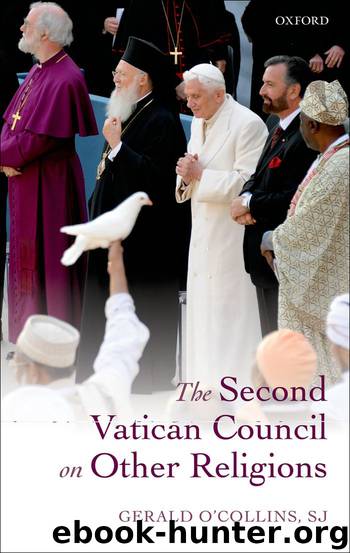The Second Vatican Council on other Religions by Gerald O’Collins

Author:Gerald O’Collins
Language: eng
Format: epub
Publisher: Oxford University Press
Published: 2013-04-14T16:00:00+00:00
Revelation and Faith for All
To explain ‘the preparation for the Gospel’ (AG 3), the Decree on the Church’s Missionary Activity quotes, in the corresponding footnote 2, two passages from Irenaeus: ‘the Word existing with God, through whom all things were made, … was always present to the human race’. Hence, ‘from the beginning the Son, being present in his creation, reveals (revelat) the Father to all whom the Father desires, at the time and in the manner desired by the Father’ (Adversus Haereses, 3. 18. 1; 4. 6. 7). Thus Ad Gentes aligns itself with Irenaeus in acknowledging the Word of God as the agent in creating all things (see John 1: 1–3, 10; 1 Cor. 8: 6; Heb. 1: 2). Consequently the Word has ‘always’ been present to the entire human race, and not merely to certain groups or nations.
Granted the Christological origin and character of creation, right ‘from the beginning’ of human history, the Son has been revealing the Father to human beings. In all its sixteen documents, it is only here that Vatican II quite explicitly applies the verb ‘reveal’ to the knowledge of God mediated through the created world. Clearly this revelation of God through creation and ‘ordinary’ human history allows for endless variety, as ‘the Son reveals the Father to all whom the Father desires and at the time and in the manner desired by the Father’. In contemporary terms popularized by Karl Rahner (Chapter 2 above), Irenaeus spoke of the ‘general’ history of revelation (and salvation), in which from the origins of the human story the Son of God has been revealing the Father.
The two quotations from Irenaeus highlight the universal divine activity by which the Word/Son of God prepares people for the coming of the gospel. Using the term ‘reveal’ for the divine activity implies the counterpart of human faith. It is with true faith that human beings respond to the initiative of the Son of God who, being present in and through creation, reveals God to them. The decree expressly acknowledges a faith-response to the personal divine revelation made by the non-evangelized: ‘in ways known to himself’ God can lead ‘those who, through no fault of their own, are ignorant of the Gospel to that faith without which it is impossible to please him (Heb. 11: 6)’ (AG 7).
Unlike the First Vatican Council, which appealed to Hebrews 11: 6 with regard to Christian believers persevering in their faith (DzH 3012; ND 122), Vatican II appreciated the significance of this verse for humanity in general, even if it is only in Ad Gentes 7 that the text makes an appearance in any of the Council’s documents.
Recognizing explicitly that the divine activity of revelation and the human response of faith also take place among those who follow other religions or none at all occurs briefly in Ad Gentes. But the decree stands apart in being the first text from the twenty-one ecumenical councils of Catholic Christianity to acknowledge expressly (a) that God’s self-revelation reaches
Download
This site does not store any files on its server. We only index and link to content provided by other sites. Please contact the content providers to delete copyright contents if any and email us, we'll remove relevant links or contents immediately.
MOSES THE EGYPTIAN by Jan Assmann(2412)
Jesus by Paul Johnson(2354)
Anthology by T J(2210)
The Plantagenets by Dan Jones(2086)
Jesus of Nazareth by Joseph Ratzinger(1811)
By Design by J.A. Armstrong(1540)
The Courage to Be Happy by Ichiro Kishimi & Fumitake Koga(1413)
Saints for All Occasions by J. Courtney Sullivan(1376)
1916 in 1966 by Mary E. Daly(1282)
Who's Who in the Age of Jesus by Geza Vermes(1236)
Abraham by James Reapsome(1234)
Our Revolution by Bernie Sanders(1225)
Abraham by David Rosenberg(1209)
Global Crisis by Parker Geoffrey(1158)
Crusade + Other Stories (Getting Started) by unknow(1140)
Photographing Families by Unknown(1134)
Stars by Sophia Bennett(1120)
The Hare with Amber Eyes by Edmund de Waal(1119)
Jesus: The Human Face of God (Icons) by Jay Parini(1097)
